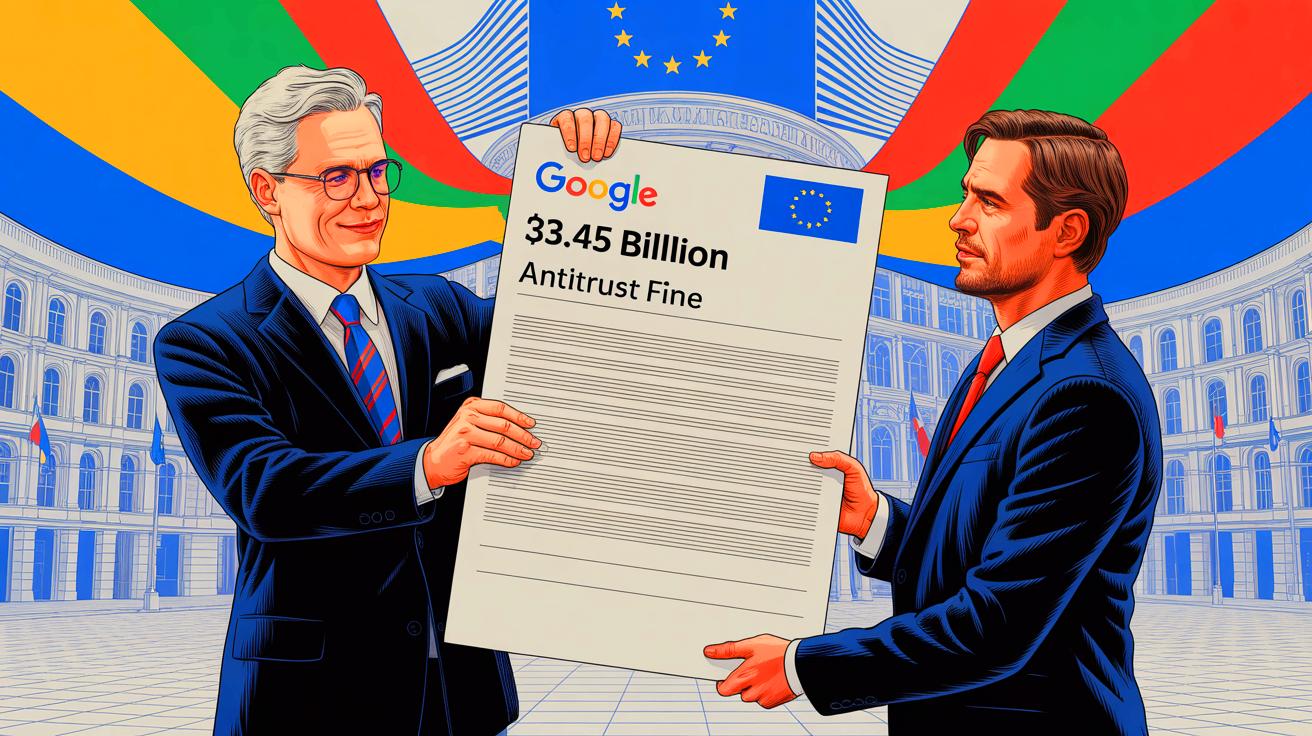IN A NUTSHELL
💰 The European Union fined Google $3.45 billion for alleged self-preferencing in its adtech services.
🌍 Former U.S. President Trump criticized the fine as “unfair” and hinted at potential trade actions.
📉 Google plans to appeal the decision, arguing it would harm European businesses.
📊 This ruling highlights ongoing concerns about market dominance in the digital advertising sector.
The European Union has levied a substantial fine against Google, amounting to $3.45 billion, for anti-competitive practices within its adtech business. This marks yet another significant penalty in Google’s ongoing battles with EU regulators. The European Commission accuses Google of self-preferencing its services, particularly its ad exchange platform, AdX, which has been central to the adtech supply chain. The consequences of this ruling could have far-reaching implications, not only for Google but also for the broader digital advertising landscape. As Google prepares to challenge this decision, questions are being raised about the future of digital market fairness and regulation.
Details of the EU Fine
The European Commission has accused Google of favoring its own online display services, which allowed the company to charge higher fees while disadvantaging competitors and online publishers. This practice, known as self-preferencing, has reportedly been in effect since 2014. The Commission has mandated that Google cease these practices and address the inherent conflicts of interest within 60 days. Failure to comply could result in more severe actions, including potential divestiture.
EU Commissioner Margrethe Vestager emphasized the importance of digital markets serving the public grounded in trust and fairness.
“Digital markets exist to serve people and must be grounded in trust and fairness,”
https://www.rudebaguette.com/en/2025/07/this-is-mass-surveillance-disguised-as-safety-googles-earthquake-detection-system-using-android-phones-sparks-global-privacy-uproar/
she stated, highlighting the necessity for public institutions to act when market dynamics falter. This action underscores the EU’s commitment to maintaining a level playing field in the digital economy.
U.S. Response and Potential Trade Actions
In response to the EU’s decision, former U.S. President Donald Trump took to Truth Social to express his discontent. He labeled the fine as “unfair” and “discriminatory,” suggesting that such actions undermine American innovation. Trump hinted at launching a Section 301 trade investigation, which would allow the United States to impose penalties on foreign entities whose actions are deemed burdensome to American commerce.
Trump’s comments reflect a broader tension between the United States and the European Union regarding digital market regulations.
“We cannot let this happen to brilliant and unprecedented American ingenuity,”
he declared, emphasizing the need to protect American companies from what he views as unfair foreign penalties. The potential for a trade investigation adds a layer of complexity to the ongoing regulatory challenges faced by Google.
Google’s Plan to Appeal
Google has not taken the EU’s decision lightly and plans to appeal the ruling. Lee-Anne Mulholland, Google’s vice president and global head of regulatory affairs, criticized the Commission’s decision. She argued that the imposed fine is unjustified and that the required changes would adversely impact thousands of European businesses. “The European Commission’s decision about our ad tech services is wrong,” she stated, defending Google’s business practices.
The European Publishers Council, however, expressed disappointment over the absence of a breakup order. Critics argue that a mere fine will not deter Google from its alleged anti-competitive behavior. Angela Mills Wade, executive director of the council, emphasized the need for stronger enforcement to prevent Google from consolidating its dominance in the age of artificial intelligence.
Implications for the Digital Advertising Landscape
The implications of the EU’s ruling against Google extend beyond financial penalties. This decision highlights ongoing concerns about market dominance and fair competition within the digital advertising sector. The fine follows previous EU penalties imposed on Google in 2017, 2018, and 2019, underscoring the persistent regulatory challenges faced by the tech giant.
Google’s advertising revenue remains a significant component of its overall earnings. In 2024, the company’s advertising revenue totaled $264.6 billion, accounting for 75.6% of its total revenue. Despite this, the exact figures for Google’s adtech business, which manages advertising on third-party websites, remain undisclosed. This lack of transparency continues to fuel debates over Google’s market power and its impact on competition.
As the digital advertising landscape evolves, the actions taken by regulatory bodies like the European Commission will play a crucial role in shaping its future. Will these efforts lead to a more balanced and competitive market, or will dominant players continue to wield significant influence? These questions remain at the forefront of discussions within the tech and business communities.
This article is based on verified sources and supported by editorial technologies.
Did you like it? 4.5/5 (24)

